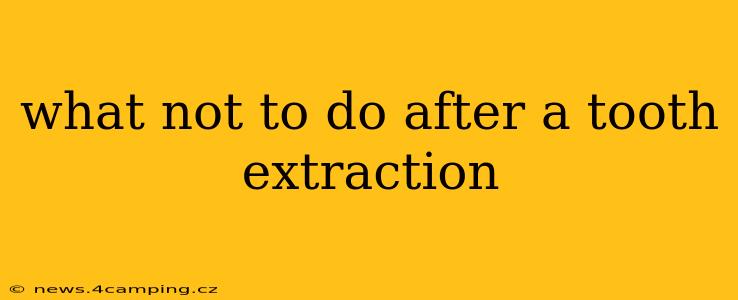What Not to Do After a Tooth Extraction: A Comprehensive Guide to Post-Extraction Care
Losing a tooth, whether it's a wisdom tooth or another, is a significant event. Proper post-extraction care is crucial for a smooth recovery and preventing complications. Ignoring essential instructions can lead to prolonged discomfort, infection, or even dry socket – a painful condition requiring further intervention. This guide outlines the crucial things to avoid after a tooth extraction.
Understanding the Healing Process:
After a tooth extraction, your mouth needs time to heal. A blood clot forms in the extraction site, which is essential for preventing infection and promoting bone regeneration. The process typically takes several days to a few weeks, depending on the complexity of the extraction. By following these guidelines, you can significantly improve your chances of a quick and uncomplicated recovery.
What NOT to Do After Tooth Extraction:
1. Don't Spit or Rinse Vigorously:
This is perhaps the most important piece of advice. Aggressive spitting or rinsing can dislodge the blood clot that forms in the extraction site. This can lead to dry socket, a painful condition where the bone is exposed. Gentle rinsing with saltwater (1/4 teaspoon of salt dissolved in 8 ounces of warm water) is acceptable after 24 hours, but avoid forceful rinsing.
2. Don't Smoke:
Smoking significantly increases the risk of dry socket and infection. The suction created by smoking can dislodge the blood clot, and the chemicals in smoke impair healing. It's essential to avoid smoking for at least 72 hours, and ideally longer, after your extraction.
3. Don't Use a Straw:
Similar to smoking, using a straw creates suction that can dislodge the blood clot. Avoid using straws for at least a week, or until your dentist gives you the all-clear.
4. Don't Touch the Extraction Site:
Resist the urge to constantly probe or touch the extraction site with your tongue or fingers. This can introduce bacteria and interfere with the healing process.
5. Don't Consume Alcohol:
Alcohol can thin your blood, increasing the risk of bleeding and delaying healing. Avoid alcohol consumption for at least 24 hours after your extraction.
6. Don't Eat Hot Foods:
Hot foods can cause discomfort and increase bleeding. Stick to soft, cool foods for the first few days after your extraction.
7. Don't Engage in Strenuous Activities:
Avoid strenuous physical activity, such as intense exercise, for at least 24 hours to minimize bleeding and allow for proper healing.
8. Don't Neglect Pain Medication:
Following your dentist's instructions on pain medication is crucial. Pain is a normal part of the healing process, but managing it effectively reduces discomfort and helps prevent complications.
9. Don't Ignore Signs of Infection:
Be aware of signs of infection, such as increased pain, swelling, fever, or pus. If you notice any of these symptoms, contact your dentist immediately.
10. Don't Skip Follow-up Appointments:
Your dentist will schedule a follow-up appointment to check on your healing progress. It's crucial to attend this appointment so they can assess the extraction site and address any concerns.
Addressing FAQs:
How long does it take for a tooth extraction to heal completely?
The healing time varies depending on the complexity of the extraction, but it usually takes several weeks for the extraction site to fully heal. You'll likely notice significant improvement within the first few days.
What should I eat after a tooth extraction?
Focus on soft, cool foods for the first few days, such as yogurt, applesauce, mashed potatoes, and smoothies. Gradually reintroduce solid foods as your pain subsides and the extraction site heals.
When can I brush my teeth after a tooth extraction?
You can usually brush your teeth gently the day after your extraction, but avoid brushing directly on the extraction site for several days.
What if I think I have dry socket?
Dry socket is characterized by intense pain, a bad odor, and a visible empty socket. Contact your dentist immediately if you suspect you have dry socket. It requires immediate attention.
By following these guidelines, you can greatly enhance your recovery after a tooth extraction and minimize the risk of complications. Remember, consistent communication with your dentist is key to ensuring a successful and comfortable healing process.
